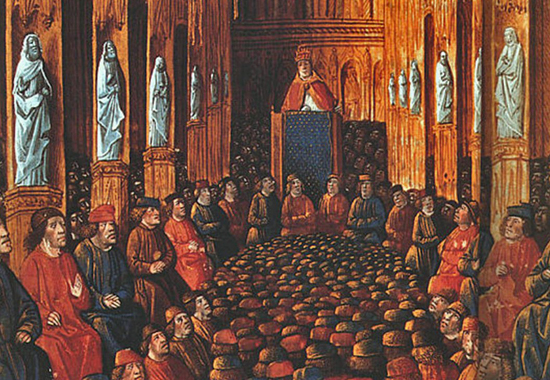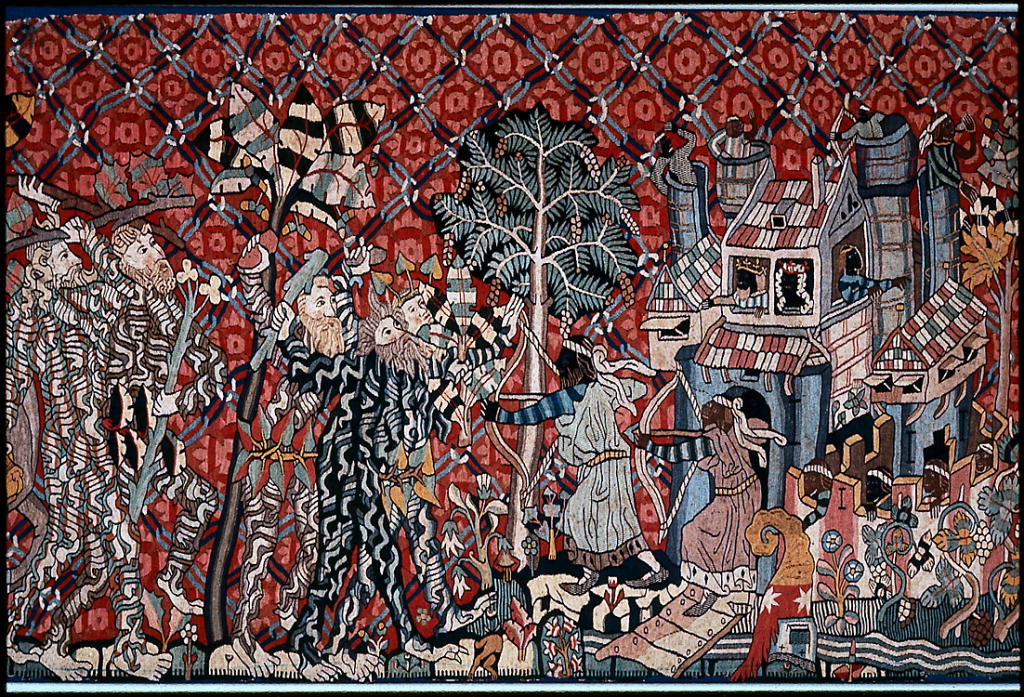Last updated on April 14, 2014
Often, people suppose that the Crusades were, primarily, fought on the basis of material gain and/or greed. That perception seems understandable – that is exactly what you will learn in any school which you attend, Christian and non-Christian alike – but the other side to the story is rarely heard.
A number of different points tell us why we always interpret them in lieu of “sin” rather than a sincere desire to retake the Holy Land. One could point to secular education and the like, but that’s far too easy an answer. We often want to push the blame to something easily identifiable. Another answer involves the association with Catholicism; Protestants develop a higher moral ground via which to judge their Catholic brethren. I call it the “We Didn’t Exist Yet” Argument, and a rather underhanded rhetorical technique too.
In my view, however, we do not necessarily need to take a negative view of the Crusades. Yes, people died, innocent and guilty alike; yes, some soldiers decided to roam around the European countryside and kill Jews. Why would I deny anti-Semitism? I also don’t want to take the traditional “we learned a whole lot about sin” method, because you can say that about literally any historical event ever (boring, to put it bluntly). Rather, I think we can say that a group of very enthusiastic and devoted Christians may have over-exerted themselves a bit.
Theologically, anyway, the basis for Urban II’s (the Pope) call for Crusade started as a rallying point against encroaching Islamic forces. Since their founding, Muslim nations grew swiftly in power, size, unity, and resources. Encroachments upon Spain and a possible invasion felt likely. European nations remained divided and engaged in minor skirmishes over little pieces of territory. The Pope owned the hearts and minds of Christendom; what else could he do to prevent the collapse of the Christian world except via a call to arms?
For our purposes, assume that Christendom is a historical term (copied from Wikipedia because I am lazy) that usually refers to the medieval and early modern period, during which the Christian world represented a geopolitical power juxtaposed with both paganism and especially the military threat of the Muslim world. In the more limited and traditional sense of the word, it refers to the sum total of nations in which the Catholic Church is the established religion of the state, or which have ecclesiastical concordats with the Holy See. In any case, the sum total of Christendom’s various understood definitions make it obvious what we are talking about: not just the unified body of believers, but governments and papacy too.
Of course, from a purely evidentiary standpoint, we don’t know exactly what Urban II said as a call to Crusade. Rather, what we do have is six different accounts written second-hand, certainly not down to the letter. Each writer interpreted those words according to their station and place in life, from monk to crusader, so the results vary. Wandering through a historical mire is icky business!

Still, regarding the six accounts of Urban II’s speech at Clermont, one clearly stands out to me: Fulcher of Chartres. Fulcher’s narrative does not mention the liberation of Jerusalem as the primary motivation behind the call for crusade. Coincidentally, Fulcher’s account also happens to correspond with Urban II’s actions in favor of the Eastern Church prior to the Council. Extant letters of Urban II before the Crusade confirm that Urban II sought primarily to defend the Eastern Church. Thus, regardless of whether or not Fulcher’s narrative is a historically reliable account (and the others are equally suspect on that account), Urban II’s thoughts during this time focused on a sincere desire to unite Christendom and protect the universal church – a kind of sincerity still applicable today if we could remove our cynicism from the equation.
In Fulcher’s account, Urban II begins with concern over the state of church leadership. Bishops were called to defend their flock at all times and to become righteous themselves to be an example to their communities.1 In other words, those who wish to be right with God must do what pleases God. Urban also condemns those who practice simony, as well as anyone who seizes a member of the clergy.2 In this way, he emphasize the Paix Dei, which sought to limit violence against the weak and oppressed.3 As Fulcher says in his accounts, Urban II states:
If anyone hates peace, how can he make others peaceable?4
The nobles and rulers of Europe are failing in their ability to prevent violence and injustice, and Urban II seeks to rectify that injustice.
These initial statements have nothing to do with the crusades. In fact, none of the other accounts bother to mention local church concerns in any manner or link historical context to Urban’s speech. In other words, Fulcher’s account does not ring an eschatological or apocalyptic tone. Urban, for Fulcher, seems concerned with intra-Christendom conflict in that
It is so bad in some of your provinces, I am told, and you are so weak in the administration of justice, that one can hardly go along the road by day or night without being attacked by robbers.5
These rulers had failed to keep the Treuga Dei, or Truce of God, reforms enacted by the Church to limit Christian-to-Christian violence on holy days.6
Fulcher finally mentions Urban’s call to crusade after these remarks. After a renewed commitment to the Peace and Truce of God, Urban calls Christendom to crusade as an extension of its duty to promote peace in Christendom.7 In Urban’s words,
Let those who have been accustomed unjustly to wage private warfare against the faithful now go against the infidels…Let those who have been fighting against their brothers and relatives now fight in a proper way against the barbarians.8
The crusade became a quest of recompense for sins done against Christians through protecting fellow Christians, and a source of unity for Christianity. Jerusalem does not warrant a mention within Fulcher’s account. In this sense, Fulcher’s account makes clear Urban’s intent to keep the Paix Dei within Christendom.
To support this conclusion, an examination of Urban II’s actual letters prior to Clermont are required to make the connection. These letters reveal that Urban II’s primary concern was the defense of the Church against Muslim powers. The Pope was concerned about Spanish conflict against the Moors prior to the Council of Clermont, specifically the border town of Tarragona; in fact, he re-established the archbishopric of the town, and urged the count of Barcelona and the Catalans to support this initiative.9 To the latter, Urban II drafted a message that promised the Catalans penance and forgiveness of sins if they offered money and support for Tarragona’s rebuilding, in the same way that a pilgrimage to Jerusalem offered the same benefits.10
In this case, Urban II declared that helping the Church maintain its borders in whatever means a person had at their disposal amounted to a holy pilgrimage; if Urban II believed that Jerusalem was the key to the crusading venture, such penance would not be offered. Even after the First Crusade began, further letters from Urban II to the Catalans emphasized the equal validity of the war against the Moors in Spain:
Since the knights of the other lands have unanimously resolved to go to the aid of the church of Asia and to liberate their brethren from the tyranny of the Saracens, so also…do you assist the church adjoining you in continuous efforts against the assaults of the Saracens!11
The outcome of Spain’s war effort would have absolutely no relevance to the war in the Middle East, though it shows Urban II’s drive to defend against the Muslim world.
——————–
1Fulcher of Chartres, ‘The Chronicle of Fulcher of Chartres, Book I,” in The First Crusade: The Chronicle of Fulcher of Chartres and Other Source Materials, trans. Martha E. McGinty, ed. Edward Peters (Philadelphia: University of Philadelphia Press, 1971): 27.
2Ibid, 28.
3William of Malmesbury and Anonymous Authors,“The Truce of God,” in The First Crusade: The Chronicle of Fulcher of Chartres and Other Source Materials, trans. Martha E. McGinty, ed. Edward Peters (Philadelphia: University of Philadelphia Press, 1971): 17.
4Fulcher of Chartres, “Medieval Sourcebook: Urban II (1088-1099): Speech at Council of Clermont, 1095 – Fulcher of Chartres,” last modified December 1997, http://www.fordham.edu/halsall/source/urban2-5vers.html.
5Ibid.
6“The Truce of God,” in The First Crusade Source Materials, 19-20.
7Fulcher of Chartres, “The Chronicle of Fulcher of Chartres,” in The First Crusade Source Materials, 31.
8“Medieval Sourcebook – Fulcher of Chartres”
9Carl Erdmann, The Origin and Idea of Crusade, trans. Marshall W. Baldwin and Walter Goffart (Princeton, New Jersey: Princeton University Press): 2010, 315.
10Jonathan Riley Smith, The First Crusade and the Idea of Crusading (Philadelphia: University of Philadelphia Press, 1997): 19.
11Erdmann, The Origin and Idea of Crusade, 317.
12Ibid, 319.
13Ibid, 319.
14Ibid, 320-322.
15Ibid, 325.
16Ibid, 326.
17Anonymous, “The Gesta Version,” in The First Crusade: The Chronicle of Fulcher of Chartres and Other Source Materials, trans. A.C. Krey, ed. Edward Peters (Philadelphia: University of Philadelphia Press, 1971): 5.
18Ibid, 6.
19A.C. Krey, “Introduction,” in The First Crusade: The Accounts of Eyewitnesses and Participants (Princeton: Princeton University Press, 1921), 7.
20Ibid, 7.
21Fulcher of Chartres, “The Chronicle of Fulcher of Chartres,” in The First Crusade Source Materials, 23.
22Ibid, 23.
23Ibid, 23.
24Jonathan Riley-Smith, The First Crusade, 22.
25Ibid, 22.

